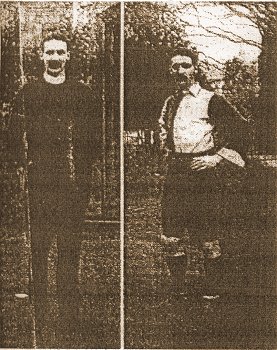|
Chapter 5.
Deacon, Priest, & Master
It was the week before Christmas of 1909
when Kenneth Hunt realised the first of his career
ambitions. It was then that he was ordained as Deacon by the
Bishop of London. He was permitted to officiate at Anglican
religious ceremonies in any parish within the capital city,
if the incumbent had given his permission. It was almost two
years before Kenneth became a fully qualified priest by
taking his final vows in London. By this time he had already
been employed at Highgate School for almost three years, and
he was to spend the next three and a half decades teaching
and counselling generations of boys at that institution.
Hunt's strong involvement in football did not wane once he
had been ordained. He even found ways of combining these
consuming passions of his life; his faith and football. In
early 1912, whilst on the playing staff of Leyton Orient F.C.,
Kenneth Hunt preached to a congregation of footballers at a
service held in St. Luke's Church in Hanley, organised by
the then Stoke City chairman, the Reverend A.E. Hurst. The
service was an annual event and it is probable that Hunt had
been especially invited to give the sermon because of his
current popularity and fame. In his address Hunt drew a
clever comparison between the temptations of good and evil,
and "two agents from rival (football) clubs". The sermon is
interesting for two reasons. Firstly, it gives some
indication of his own understanding of the appeal of
football, and the qualities needed to perform well in the
game. In discerning the "strong and weak points of each
man's game", Hunt cited the criteria of "... his pluck, his
keenness, his perseverance, his love of applause and
popularity, his self-indulgence".
|
|

Kenneth Hunt as priest and footballer,
1912. |
Perhaps it is significant that he failed to
mention anything that was related to talent or skill, and chose
only to emphasise the more 'physical' attributes of the sport,
which he himself was well known for. It suggests what his
priorities would have been when identifying desirable qualities
in his ideal footballer.
The second point of interest in the sermon is found in the
reference he made to the "wages" being offered by the rival
"managers", (i.e. God and the Devil). The wages for playing
for the former "manager" was "eternal life", compared with
the "wages of sin" being" death". The question of what
constituted 'adequate' wages for British professional
footballers had been contentious since the advent of
professionalism in the mid 1880s. By making reference to
this, Hunt showed a clever use of topicality, but what is
even more significant is that Kenneth Hunt himself was never
paid for football performances. |
|
Unlike the vast majority of his fellow
players, he did not have to rely on wages from a Club to
maintain a home and family. Cynics might have cautioned him
to steer clear of reference to wages, due to its
controversial nature and the fact that Hunt himself would
not have had a first hand understanding of their
significance. There is a danger that he could have been
accused of patronising other players in his Congregation,
who did not have his education nor middle class upbringing.
However, this is very unlikely to have been Hunt's motives,
when his personality and consideration for others is taken
into account. What is a more acceptable, charitable and
likely view of his choice of metaphors is his ability to
preach effectively to a congregation by reference to issues
that they would be able to readily relate to and understand.
Hunt never held a 'living' in an Anglican parish as his
father had done, but he was the Chaplain of Highgate for
many years and seemed to have taken a pride in his preaching
ability. He returned to Wolverhampton on several occasions
between the wars to preach to the young men of the town, and
when evacuated to Westward Ho! at the outbreak of the Second
World War, he became a 'visiting preacher' to the churches
of that town. Even when he retired to Heathfield in 1945, he
could still be found on a Sunday giving a sermon at one of
the neighbouring churches. Kenneth Hunt believed
passionately in the message of Christianity, and he thought
little of those who were not willing to find new and
interesting ways of conveying its meaning. After being
addressed by a 'cricketing' parson in the Chapel at Highgate
one Sunday evening, one of Hunt's fellow masters commented,
"That was a jolly good sermon he preached tonight". "Oh?",
replied Hunt, unimpressed, "not half so good as his other
one!".
|

|

|

|
Return
to
Chapter 4 |
Return
to
the contents |
Proceed
to
Chapter 6 |
|